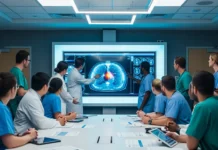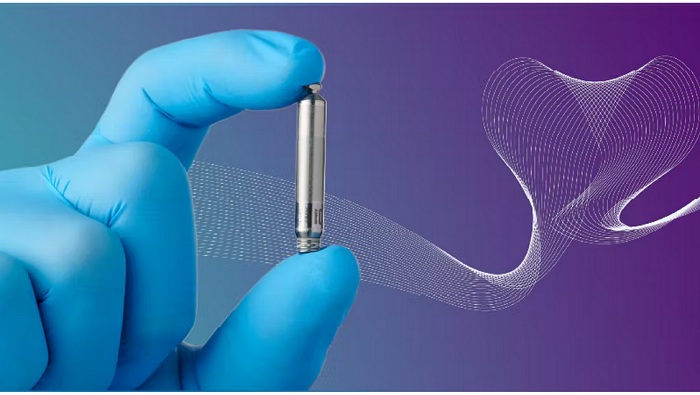Abbott announced the world’s first patient implants of a dual-chamber leadless pacemaker system as part of its AVEIR DR i2i™ pivotal clinical study. The implant of Abbott’s investigational Aveir™ dual-chamber leadless pacemaker represents a significant technological milestone for leadless pacing technology and is the first to occur around the world within the pivotal trial.
The study is being co-chaired by Daniel J. Cantillon, M.D., clinical trial steering committee co-chair and Associate Section Head and Research Director of Cardiac Electrophysiology and Pacing, Cleveland Clinic., and Reinoud Knops, M.D., Ph.D., clinical trial steering committee co-chair and Department of Cardiology and Electrophysiology, Amsterdam University Medical Center, The Netherlands.
People who experience a slower-than-normal heart rate may receive a pacemaker — a small battery-powered device implanted in the chest that delivers electrical impulses via thin insulated wires, called cardiac leads, that cause the heart muscle chambers to contract to help restore a normal heart rhythm. Unlike traditional pacemakers, leadless pacemakers are implanted directly into the heart through a minimally invasive catheter-based procedure and eliminate the need for cardiac leads. While leadless pacemakers work like traditional pacemakers to regulate heart rate, they offer reduced lead-related complications and a less restrictive recovery period due to the minimally invasive implant procedure.i Yet historically, leadless pacing options have been limited to single-chamber devices because synchronization of two leadless pacemakers has been highly difficult to achieve.
Abbott solved for this challenge by designing the company’s innovative “i2i technology” to provide beat-by-beat communication between two leadless pacemakers, one positioned in the right ventricle and one positioned in the right atrium. This technology is designed to regulate the heart rate synchronously between chambers and allow for true dual-chamber leadless pacing.
The first implant was performed at Na Homolce Hospital in Prague, Czech Republic, led by site principal investigator Petr Neuzil, M.D., Ph.D., Head of the Department of Cardiology, and assisted by site co-investigator, Vivek Y. Reddy, M.D.
“The first-in-human implant of a dual-chamber leadless pacemaker is a major clinical milestone that will open up new possibilities for patients requiring pacing support,” said Dr. Daniel J. Cantillon. “Abbott has designed a device capable of treating these patients, and we’re excited to see this technology advance patient care.”
Abbott has focused significantly on driving leadless pacing technology that can potentially improve care for more patients battling abnormal heart rhythms. The latest milestone for the Aveir DR leadless pacemaker follows recent data showing that Abbott’s investigational single-chamber leadless pacemaker – Aveir VR – met the pre-specified primary endpoints in its pivotal trial.
“As leadless pacing technology has evolved, we’ve always viewed dual chamber leadless technology as a therapy evolution that would have a dramatic impact on more patients – but a technology that was going to be very challenging to develop,” Dr. Reinoud Knops. “That we’ve reached this point in time where dual chamber pacing without leads has become a reality is a monumental moment for modern medicine.”
Because nearly 80% of people who receive a pacemaker need a dual-chamber option to pace both chambers on the right side of the heart, Aveir DR has been designed to address a critical need for these patients. Abbott also designed the Aveir DR leadless pacemaker to be retrievable, so the system can be replaced or retrieved as therapy needs evolve. The Aveir DR system is designed to provide real-time mapping capability so physicians can assess therapy delivery and reposition the device before implant during a patient’s procedure.
“The Aveir DR dual-chamber leadless pacemaker builds upon our Aveir VR single-chamber leadless platform, and we believe that once approved these systems have the potential to change the way doctors approach the treatment of abnormal heart rhythms,” said Randel Woodgrift, senior vice president of Abbott’s cardiac rhythm management business. “The involvement of world-class heart institutions in this study reinforces that the innovations we are developing are exactly the kind of advancements physicians around the world want for their patients.”
About Abbott
Abbott is a global healthcare leader that helps people live more fully at all stages of life. Our portfolio of life-changing technologies spans the spectrum of healthcare, with leading businesses and products in diagnostics, medical devices, nutritionals and branded generic medicines. Our 113,000 colleagues serve people in more than 160 countries.

















